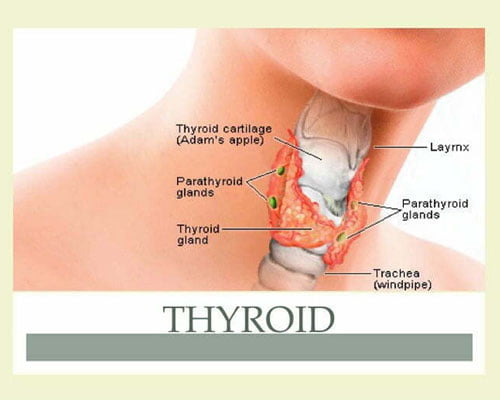Is there a miracle cure for dry mouth induced by thyroid disease/treatment?
January 19, 2020 | Dry Mouth / Oral Health / Saliva / Xerostomia

On the Lookout for a Miracle Cure for Dry Mouth Caused by Thyroid Disease and Thyroid Disease Treatment
Thyroid disease and thyroid cancer can cause xerostomia, the uncomfortable condition of dry mouth. When left untreated, thyroid conditions can cause serious health complications, so forgoing treatment is out of the question. And though treatment can help manage symptoms of thyroid disease/cancer, it won’t relieve symptoms of dry mouth. In fact, thyroid disease treatment often causes dry mouth as well. The challenge, then, is to manage thyroid treatment and xerostomia at the same time.
Many patients experiencing the effects of thyroid disease and dry mouth often search for miracle treatments, but do these really exist? Let’s find out.
What is Thyroid Disease and Why Does it Cause Dry Mouth?
Thyroid disease is an umbrella term for a group of conditions that affect the thyroid gland, a butterfly-shaped gland in the neck responsible for regulating metabolism, temperature, several hormonal functions, and more. The two main types of thyroid disorders are hypothyroidism, where the thyroid doesn’t produce enough hormones, and hyperthyroidism, when the thyroid produces too many hormones.
Both types of thyroid disease can cause dry mouth, as they interfere with the hormonal functioning of the salivary glands. In fact, it has been reported that about half the number of people diagnosed with xerostomia also have thyroid disease.
Specific types of thyroid disease associated with dry mouth include:
- Hashimoto’s thyroiditis, an autoimmune condition in which the thyroid gland functions less.
- Subacute thyroiditis, inflammation of the thyroid gland, which can cause hypothyroidism or hyperthyroidism.
- Subclinical hypothyroidism, early-stage thyroid disease
- Grave’s disease, a common form of overactive thyroid
Treatments for Thyroid Disease and Thyroid Cancer that Cause Dry Mouth
At the same time that thyroid disease can cause dry mouth, several thyroid treatments also do.
The most common treatments for thyroid disease include:
- Medications: Levothyroxine is often prescribed for hypothyroidism and a certain type of thyroid cancer. It works by producing synthetic hormones to help restore balance in the body. At the same time, one of its listed side effects is dry mouth.
- Radiation therapy: Radiation therapy is often used to treat thyroid cancer. While killing cancer cells, the radiation may also damage the salivary glands, causing hypothyroidism.
- Radioiodine therapy: Radioiodine is also used to treat thyroid cancer, as well as some types of hyperthyroidism. This treatment may damage the salivary glands, resulting in the uncomfortable feeling of dry mouth due to low or no saliva production. Impaired saliva production may then cause complications in the gums, teeth, and general oral health.
- Thyroid hormone replacement therapy: Usually, dry mouth can improve with treatment of hypothyroidism. But in some cases, excessive thyroid hormone replacement can also cause dry mouth.
The chosen course of treatment depends on the cause of thyroid malfunction, the severity of symptoms, and of course, the individual.
Dry Mouth and Its Effects on Oral Health
Saliva has many important roles in the mouth, including helping with chewing, tasting, speaking, maintaining oral health, and more. Lack of saliva, aka dry mouth, may sound like a minor inconvenience, but persistent dry mouth can significantly lower a person’s quality of life. Dry mouth doesn’t only include dry lips, tongue, and throat, but several other symptoms like a decreased ability to speak and chew, a change in taste, bad breath, and more.
Dry mouth has a particularly negative impact on oral health, as it can cause cavities, gum disease, mouth sores, and oral infections. It can also make wearing dentures difficult, which can further impact chewing ability.
If dry mouth occurs as a result of thyroid disease or treatment, patients should seek medical attention from a dentist, oral medicine specialist, or oral and maxillofacial surgeon.
Thyroid cancer patients have excellent survival rates, which makes it even more important to find a long-term solution for improving their quality of life. If thyroid disease or its many treatments have damaged the salivary glands, it’s important to treat dry mouth symptoms sooner rather than later by using a remedy or relief method best fit for your condition and preferences.
Is There a Miracle Cure for Dry Mouth?
In the world of science and medicine, there is no such thing as a “miracle cure” for any disease or condition. There are, however, several viable treatment options for dry mouth caused by thyroid disease/cancer and its treatments.
Dry mouth therapy options include:
- Intraoral electrostimulation: The SaliPen is a small, handheld device that offers a non-pharmacological, non-invasive xerostomia treatment. It works by delivering electrical pulses to increase the body’s natural production of saliva. Not to worry — the shocks are minimal and, thus, not painful, and the device is approved by the FDA.
- Over-the-counter remedies: Sugar-free chewing gum, throat lozenges, sprays, and mouthwashes can increase the body’s natural production of saliva or provide replacement saliva to alleviate discomfort.
- Prescription medications: Pilocarpine and cevimeline are two prescription medications that increase the body’s natural production of saliva. These will only be options if patients are able to tolerate their side effects and if they don’t interfere with other medications the patient is taking.
- Lifestyle changes: Drinking more water during the day, decreasing intake of caffeine, nicotine, and alcohol, and using a humidifier at night are lifestyle changes that can be incorporated simultaneously with any of the three dry mouth treatment options described above.
As with any medical decision, it’s important to talk about your options with a healthcare professional and arrive at a treatment plan customized to your specific situation.
Here you can find more information about intraoral electrostimulation and how the SaliPen works to treat dry mouth >> https://saliwell.com/product/salipen/
Frequently Asked Questions
Why does thyroid disease cause dry mouth?
Thyroid disease affects the functioning of the salivary gland, which controls saliva production. When impaired, the salivary glands cannot produce sufficient saliva, which can lead to all of the unpleasant xerostomia symptoms like dry and cracked lips, difficulty speaking and swallowing, etc.
Why does thyroid disease treatment cause dry mouth?
Certain types of treatments for thyroid disease and thyroid cancer — like radiation therapy, radioiodine therapy, hormone replacement therapy, and certain medications — may correct symptoms of thyroid disease but can end up damaging the salivary glands or causing them to malfunction, resulting in dry mouth.
How does dry mouth affect oral health?
Dry mouth is when the body does not produce enough saliva, a necessary component in chewing, tasting, speaking, etc. Lack of saliva can have a negative impact on oral health, causing frequent cavities, gum disease, mouth sores, and oral infections. It can also make wearing dentures difficult, which can impede chewing ability.
Can I be treated for thyroid disease and dry mouth?
Yes! You can and should be treated for both, as they both can have serious negative effects on your health. However, you must coordinate between the physician treating your thyroid condition (endocrinologist, oncologist, etc.) and the dentist, oral medicine or oral pathology specialist, or oral and maxillofacial surgeon treating your dry mouth.
Is there a miracle cure for dry mouth?
There is no miracle cure for dry mouth but there are several effective treatment options, including intraoral electrostimulation, medications, throat lozenges, chewing gum, and more.
Does intraoral electrostimulation hurt?
No, intraoral electrostimulation does not hurt, it works by delivering small pulses into your mouth and is an effective non-pharmacological treatment for dry mouth.

